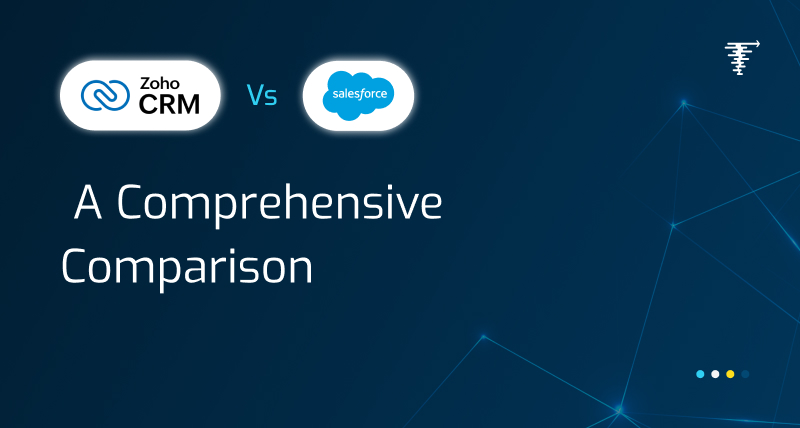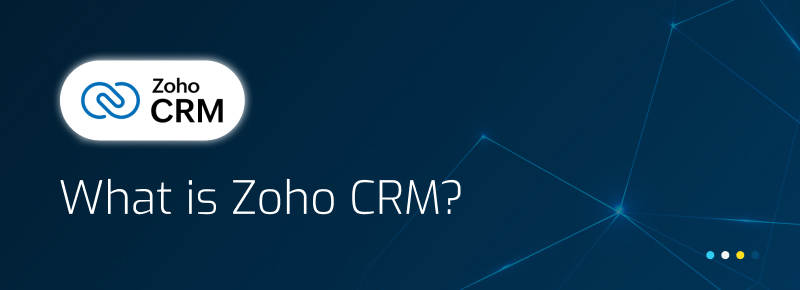

A CRM (Customer Relationship Management) system is more than just a tool for managing customer relationships. It’s a strategic asset that helps you understand, anticipate, and address your customers' needs, transforming every interaction into a lasting partnership.
We know choosing the right CRM for your business can be overwhelming, especially when deciding between Zoho and Salesforce. Both CRM systems offer robust features, exceptional functionality, and significant benefits to streamline sales, marketing, and customer service processes.
But you are still unsure which one is the best fit for your business. This blog post will help you discover when Zoho proves invaluable and when Salesforce does its magic.
Read on to make an informed decision!

Zoho CRM is a cloud-based CRM platform which gained popularity for its user-friendly interface, affordable pricing, integration, other robust features and its Zoho products. According to Zoho research, over 100 million users leverage this CRM globally. This staggering growth underscores its importance among businesses that seek the best solution to manage projects.
Zoho CRM Features:
Read Also: HubSpot Vs. Salesforce: Which Platform is Best For Your Business?

Salesforce is a software-as-a-service and cloud-based CRM platform which is popular for its robust features, powerful customisation options, and seamless integration capabilities. It is widely used for managing complex projects of large enterprises by bridging the gaps between data silos from distinct departments. Salesforce Consulting services offers a holistic view of each customer's interaction with a brand and a great Zoho CRM alternative for large-scale businesses.
Salesforce CRM Features:
Related Blog: HubSpot Marketing Hub Vs. Salesforce Marketing Cloud
Understanding all the core features and usage allows you to opt for the right CRM which suits your business needs. So, here we'll discuss Zoho and Salesforce CRM comparison that helps you make an informed decision.
| Features | Zoho | Salesforce |
| Ideal for | Small-mid size businesses. | Medium-large enterprises. |
| Free trial | Unleash the benefits of free trails to test the platform before purchasing. | Free trail is not optional or available in Salesforce CRM. |
| Ease of use | Easy, handy and simple to navigate. | Little complicated for than Zoho for the users new to Salesforce. |
| Contact management | Offer robust contact management features. | Experienced exceptional contact management features to track interactions, and store and segment contacts. |
| Built-in automation | Built-in automation features allow users to automate tasks like lead generation and email campaigns. | Advanced automation features, including AI-powered tools, can help automate tasks and predict customer behaviour. |
| Reporting | You can track key metrics and analyze performance. | Advanced reporting features with a wider range of customizable reports and dashboards |
| eCommerce integrations | Integrate well with e-commerce platforms to track sales, manage customer orders, and provide post-purchase support. | It allows e-commerce integrations and provides separate packages for e-commerce to cater to their needs. |
| Lead management | Manage lead efficiently including lead scoring, lead assignment, and lead nurturing. | Advanced lead management capabilities with AI-powered tools that can help identify and prioritize high-quality leads. |
| Email marketing | Built-in email marketing features to create and send email campaigns, track email performance, and manage email lists. | More advanced email marketing features to create and send email campaigns, track email performance, and manage email lists. |
| Sales forecasting | It offers comprehensive sales forecasting tools, allowing users to predict future sales revenue and identify sales opportunities. | More advanced, sophisticated forecasting models and analytics. |
| Overall functionality | The rough user experience of Zoho reflected in its lower price tag. | It offers a more comprehensive set of features, with more advanced capabilities in areas like AI, automation, and integration. |
| Task and issue tracking | Most attractive interface and issue tracking gets its own distinct module. | It isn't ideal for day-to-day task management and lacks dedicated native issue tracking modules. |
| Scalability | Limited capabilities even with the enterprise-level. | Thousands of applications, a comprehensive suite of cloud products, and premium options for growing enterprises to meet any business need. |
| AI | Zoho's well-established AI assistant is cheaper than Salesforce's. | The Einstein Assistant is well integrated with useful generative AI. |
| User interface | Easy to use and more intuitive than Salesforce. | Salesforce can be more complex to navigate, especially for users who are not familiar with CRM software. |
| Sales signal | It offers sales signal features, providing insights into customer behavior and identifying potential sales opportunities. | Salesforce's sales signal features are generally considered more advanced, with more sophisticated analytics and predictive capabilities. |
| Support | Offer excellent customer support. | You can experience advance rea-time customer support. |
| Layout rules | Customising the appearance and behavior of different record types using layout rules. | Create rules that display distinct fields or buttons for different record types and owners. |
| Custom modules | Create custom modules, tailoring the platform to their specific business needs. | Create custom modules to your specific business needs. |
| Customisation | You can customise Zoho as per your business requirements. | Advance customisation features from single feature. |
As you have seen both CRMs possess a lot of similar and a few distinct features but still choosing one may seem difficult. One of the major differences between Zoho and Salesforce is pricing. Zoho CRM's enterprise tier "unlimited plan" is only 15% of the cost of Salesforce's top-tier "unlimited plan". The second major difference is plug’n’play integrations and custom integrations where Salesforce CRM has an upper hand over Zoho CRM.
Choosing an apt CRM system is essential for facilitating processes and improving client interactions. Small and medium-sized enterprises may find Zoho CRM's packages reasonable and user-friendly. On the other hand, because of extensive capabilities, scalability, and customisation possibilities, Salesforce is a great alternative for firms at the corporate level, especially those with complex requirements.
But the ideal match for your company will be determined by considering your budget, features, benefits, time, and unique requirements. Free trials are available with Zoho but not with Salesforce. Considering all these factors will help you make an apt choice that will successfully advance your company.
Get The Right CRM For Your Business Growth. Connect Today!